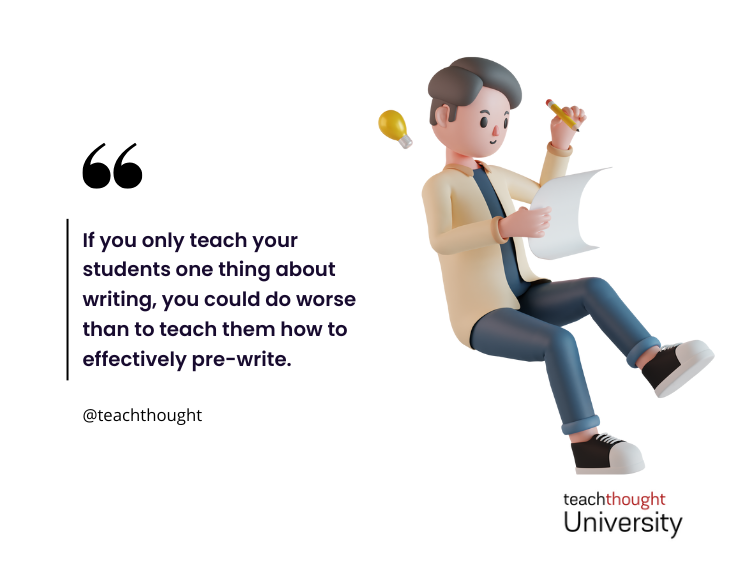If You Only Teach Students One Thing About Writing
Pre-writing can include clarifying audience and purpose to researching and outlining, making it crucial to the quality of the writing.

(Arguably) The Most Important Step Of The Writing Process
by Terry Heick
If you only teach your students one thing about writing, you could do worse than to teach them how to effectively pre-write.
Of course, there’s more to it. The writing process is a sequence of objectives (also with a purpose of their own), each with its own application, utility, and nuance.
Clarifying the purpose of a piece of writing–what it is intended to accomplish–is probably the beginning of most writing, whether an assignment in a classroom or something in the ‘real world.’ And it all starts with effective pre-writing.
The Purpose Of The Writing
Years ago, I was 150 pages into writing a book when I realized the content wasn’t exactly what I intended. I was writing for myself and not with the reader in mind. It took me six months to fix a mistake that could’ve been avoided with another few days of pre-writing. I was so eager to write that I started just a hair off from my intended purpose in the beginning, and several chapters later had blown completely off course.
As a teacher, I’d often read wonderfully-written essays by students who had completely missed the point of the assignment, which was okay because it showed me what that student needed–more effective pre-writing–while they were already effective in finishing a draft.
The way I explained it to students is to imagine someone painting a house, and they did an amazing job. It was a beautiful shade of lavender painted exquisitely–but the homeowner had asked for blue. I would tell them that the writing was strong but imprecise.
Other times, in extended response assessment items, students would, again, have a very well-written response that answered the ‘question’ (or addressed the prompt) incorrectly or didn’t respond to the prompt itself but something close to the prompt.
See also A Writing Strategy That Works For Every Student, Every Time
The Writer’s Purpose
What’s the difference between writer’s purpose and author’s purpose?
A writer’s purpose is the main reason he or she has for writing–usually a student in a classroom, but the term could really apply to any writer. (While one could argue that these terms are the same, the connotation of ‘author’s purpose’ has more to do with analyzing and scrutinizing the writing of an actual author while the ‘writers’ are developing writers as students. We will explore what educators typically refer to as ‘Author’s Purpose’ in another post.)
Some questions to clarify a writer’s purpose (or the purpose of the writing product itself) could include:
Why are you writing?
What message are you wanting to communicate? If the readers understand nothing else, what’s the one thing you need for them to take away from their reading?
What effect should the writing ’cause’ or do?
What should the writing product accomplish? How will you know if it’s successful or not?
If the purpose is not accomplished, what’s at stake?
How might the Purpose and Audience inform the genre, structure and other elements of the writing so that it’s more likely to achieve its Purpose?
Purpose is, of course, linked closely to Audience: who are you writing for? Who wants or needs to know the information/ideas in writing? Who would benefit?
See also 25 Ways Schools Can Promote Literacy And Independent Readers
The Audience Of The Writing
An equally important step in the writing process is establishing a clear audience–who wants or needs or would benefit from the information or ideas contained in the writing. Audience and purpose together form the foundation of classroom writing–ideally writing that leaves that classroom to achieve an authentic purpose to an authentic audience. This, too, is pre-writing.
So, what, then, is the ‘most important step’ of the writing process? Of course, this is subjective and depends on grade level, the purpose of the writing, the experience and skill of a specific student/writer, and so on. But pre-writing as a concept or definition is simple–anything the writer does the prepare to write. Drafting without this preparation is not setting students up for success.
Ask them if they’d drive across the country without a map or attempt to cook a complicated meal without a recipe. These kinds of rhetorical questions can emphasize the critical importance of effective pre-writing. And note, it has to be pre-writing that the student understands and believes in–pre-writing that they have confidence in to guide them rather than cursory research and vague, imprecise outline that is merely going through the motions.
Good pre-writing provides the writer with everything they need to successfully achieve their purpose. It can also save considerable time revising a paper that missed the mark in crucial ways.
And that makes it as important as any step of the writing process.
